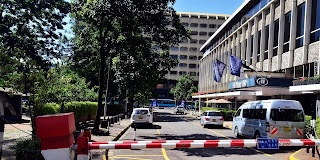Two major global hospitality brands, the InterContinental Hotel Group and the Hilton Group, plan to exit their investments in two of the oldest hotels in Nairobi, namely the Nairobi Hilton and Hotel InterContinental. Both are five-star hotels that have been operating since 1969.
The implications of their exit for the economy in terms of lost jobs, the country’s position as a tourist destination and our reputation as a good investment location will be far-reaching.
The InterContinental Group and their local partners — the state-owned Tourism Finance Corporation (TFC), Moi family-owned Sovereign Trust Limited and state-controlled Development Bank of Kenya (DBK) — recently placed the hotel on the market, inviting offers and proposals from realtors to either lease or convert the building into a mixed-use property.
The circumstances of the Hilton Group are not too dissimilar. For nearly 10 years, the American owners have more or less been blocked from refurbishing the hotel as the government kept dithering over its plans to sell the 40.5 per cent stake in the property that is held by TFC on its behalf.
Make no mistake, the land and buildings where the InterContinental stands are not being sold because of the ravaging impact on Covid-19 on the hospitality industry. Had the government been wiser, we could have — when the time was ripe — done what wonks call capital recycling. You sell your stake to institutional investors when the time is right and reinvest the entire proceeds in new assets.
TFC-owned hotels
As I perused through the archives to track the evolution of decision-making since a 2009 Cabinet meeting decided that government shares in three TFC-owned hotels — namely, the Hilton, the InterContinental and Mountain Lodge — be privatised, I came to is the following inescapable conclusion.
The InterContinental is where it is today because of the hands of men: Toing and froing ,dithering and inability to make the right decisions at the right time between the management of TFC, the Moi family, the Ministry of Tourism, the National Treasury and the Privatisation Commission (PIC) is why the hotel has died.
As you look through the files closely, the picture you see is that of machinations by influential local oligarchs who, just like the vultures that they are, have all along been quietly circling the hotels.
They have been pulling strings behind the scenes to, first, block attempts by foreign investors at injecting capital in the businesses; secondly, artificially depress the value of the assets; and, finally, set the stage for the oligarchs to snap up the land and buildings on the cheap.
The scheme was implemented in two stages. First, the foreign investors were literally prevented from injecting capital in the businesses and told to wait until after the government leaves. In the next stage, the oligarchs came up with scheme after scheme to make sure that privatisation did not take place as planned.
I have seen a July 2014 letter by TFC’s former CEO, Marianne Ndegwa Jordan, to Treasury Cabinet Secretary at the time, Henry Rotich, pleading with the government to let privatisation proceed. She informed the minister that the American investors were ready to inject $75 million into refurbishing the hotel and were tired of waiting for the planned privatisation.
As the foreign investors were being forced to wait, the value of the asset kept dwindling. Clever manoeuvres by Sovereign Trust were a major factor in the postponement of the planned privatisation.
Privatisation
I have seen correspondence showing that when the privatisation was about to start in earnest in early 2014, the Moi family wrote to the Privatization Commission offering to purchase the shares owned by the government in the hotel at Sh1.9 billion (Sh325 per shares).
A few months later, the company secretaries of the InterContinental Group received a separate letter in which the Moi family had brought down their offer to Sh628 million (Sh107 per share) which the Privatisation Commission declined to accept. The privatisation plan collapsed.
Mark you, the Cabinet had directed that the shares be privatised by allowing the local shareholders of the hotel to exercise their preemptive rights. Sovereign Trust, with a 19.38 per cent stake, was, therefore, in pole position to clinch the deal.
The remaining local shareholders hold minimal stakes. The only other significant stake in the company is the 10 per cent indirect share owned by the TransCentury Group in DBK, which, in turn, owns a 12.99 per cent shares in the hotel.
All the Privatization commissioners who resisted the transaction have since left with former chief executive Solomon Kitungu replaced by Joseph Koskey, formerly Sovereign Group CEO.
Call me a conspiracy theorist if you wish. The government should not allow the InterContinental to get into the hands of property merchants. And, let us decide what we want to do with the Hilton. BY DAILY NATION
There's no story that cannot be told. We cover the stories that others don't want to be told, we bring you all the news you need. If you have tips, exposes or any story you need to be told bluntly and all queries write to us [email protected] also find us on Telegram

